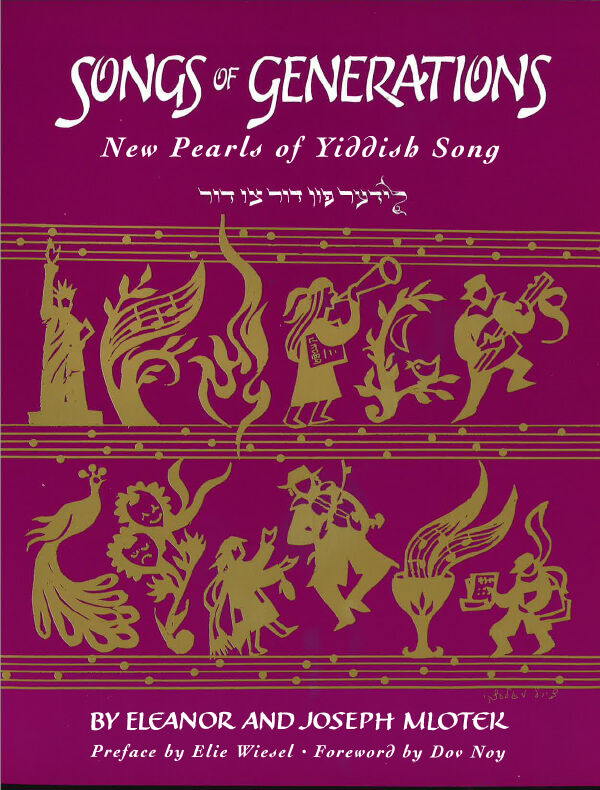Words by Moishe Broderson (1890-1956), music by David Beigelman (1887-1944). In the children’s song anthology Unter di grininke beymelekh, compiled by S. Bastomski (1931) some of the words differ: “Noyt un tsores blien / Toyt un hunger vaksn,- / Darf men ibershmidn / Shtol oyf naye aksn” (Poverty and troubles bloom, death and hunger grow, so we must reforge the steel on new axles). Leizer Wolf paraphrased the song in “Tif in vald baym fayer” for the “Bin” (Bee) Scout Organization of Vilna (Binishe lider, 1932). His refrain reads: “Hey, hey, voyl di binen, / Voyl iz zey un gut, / Velder hobn zey in zinen, / Blumenzaft in blut” (Hey, happy are the Bees; happy and well; they have the woods on their minds; petal juice in their blood).

Jews are forging, singing,
singing is the main thing;
ringing iron, ringing,
spraying bits of sparks.
Hey, hey, the blacksmith has it good,
it is going well for him,
his steel-and-iron limbs
ignite courage.
People, pathetic, blind,
groping in the dark,
now they ought to be
shod like horses.
Grief and anger glow,
of course, they want to be free,
so we must re-forge
swords into plowshares.
Yidn shmidn, zingen,
Zingen iz der iker;
Klingen ayzns, klingen,
Shpritsn funken shtiker.
Hey, hey, voyl dem shmider,
Voyl iz im un gut,
Zayne shtol – un ayzn-glider
Tsindn on dem mut.
Mentshn, nebekh, blinde,
In der fintster tapn,
Darf men zey atsinder
Podkeves tsuklapn.
Tsar un tsorn glien,
Viln dafke fray zayn,
Darf men ibershmidn
Shverd oyf aker-ayzn.
ייִדן שמידן, זינגען,
זינגען איז דער עיקר;
קלינגען אײזנס, קלינגען,
שפּריצן פֿונקען שטיקער.
הײ, הײ, װויל דעם שמידער,
װױל איז איס און גוט,
זענע שטאָל- און אײַזן-גלידער
צינדן אָן דעם מוט.
מענטשען, נעבעך, בלינדע
אין דער פֿינצטער טאַפֿן,
דאַרף מען זײ אַצינדער
פֿאָדקעװעס צוקלאַפֿן,
צער און צאָרן גלוען,
װילן דװקא פֿרײַ זײַן,
דאָרף מען איבערשמידן
שװערד אױף אַקער-אײַזן.
Song Title: Yidn Shmidn

The Songs of Generations: New Pearls of Yiddish Song anthology comprises songs that were either never printed before or appeared in rare and inaccessible publications — sometimes in different versions and without proper sources. Most of the songs in this book were submitted by readers of Chana and Yosl’s column “Perl fun der yidisher poezye” (Pearls of Yiddish Poetry) in the Yiddish newspaper Der Forverts (The Forward), initiated in October, 1970. Over 25 years, thousands of songs were collected in correspondence and on cassettes from readers throughout the world, and they represent a veritable national Yiddish song archive. Chana Mlotek, in her introduction, writes, “In the course of years the inquiries, contributions and enthusiasm of these readers have kept our own interest unflagging and have reinforced our dedication to this effort. And in recent years our participants have also been augmented by new readers from the former Soviet Russia, who receive our newspaper there or from newly-arrived immigrants in this country and Israel.”